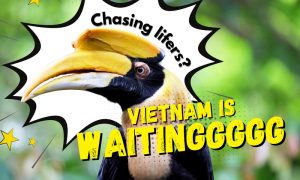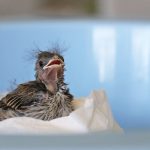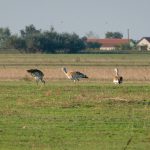Nature, in all its myriad forms and illimitable glory, makes for a mighty enticing blogging topic. In a sense, blogs have become extensions of personal field notes, nodes for naturalist networking. The burgeoning swell of sites devoted not just to birds and bugs but to flora and fauna of every stripe speak to the endless fascination of the natural world. And yet, no matter how scintillating its subject, web writing that aspires to greatness must deliver more than dry, lifeless description. While I sometimes imagine myself a connoisseur of superior nature blogging, it’s more reasonable to say that I read a lot of nature blogs and know what I like. Here are 6 features I seek in nature blogs:
1. Show Me Something Cool
Nature is enjoyed through the senses, not on a logical plane but a primal one. I might not be able to hear, smell, taste, or feel what you’re blogging about so at least let me see it! The single most important element that distinguishes merely good from truly great nature blogging is imagery. The advent of easy digital photography augmented by royalty-free pictures and illustrations ushered in an age where posts need never go unembellished again. This is not to say that every post needs an associated image but if you’re writing about a particular species or site, a picture or two makes a difference. Even better, a great picture makes a huge difference. Simply put, words are necessary but not sufficient; visual imagery should be a staple in every nature blog.
2. Teach Me Something
Some of the most engaging posts are those written by experts expounding upon some esoteric fact about natural history. Right alongside those entries are ones put together by amateurs inviting readers inside the learning process as they grapple with new information. Nature is, by nature, infinite. No one of us can understand it all. However, the type of reader attracted to a nature blog is inherently inquisitive. Those blogs that seek to share knowledge or cultivate understanding are usually rewarded with further visits.
3. Let Me Teach You Something
Blogging stands apart from what we like to call dead-tree media in that it is immediately interactive. On most blogs, if I have a reaction to a post, I can immediately leave a comment or send a quick e-mail. Superior bloggers not only invite but cultivate such interaction, setting the stage for readers to enhance the dialogue. Step 2 dictates that a nature blogger should know a few things about his or her subject matter. This step allows that sometimes, the best post is the one in which you admit that you don’t know everything but are willing to learn.
4. Take Me With You
Appreciation of nature tends to be a holistic experience. A person doesn’t just love birds or butterflies or trees. A person loves a saltmarsh or a desert or a prairie, with all its attendant animals, insects, and plant life. Immersive nature writing first sets the stage, then proceeds to populate it with marvels. So don’t just tell me what you saw… tell me where you saw it and why that matters. Bonus points go to the bloggers who provide sufficient details to allow others to follow in their footsteps. Birding in particular is an avocation that relies heavily on reports from trailblazers and first respondents.
5. Tell Me a Story
The old playwriting adage that there is no drama without conflict pertains to blogs as well. Most nature posts are stories and should be crafted as such. The classic three-act structure, as handed down from almighty Aristotle himself, consisted of exposition leading to complication ending in resolution. Instead of detailing in dry, lifeless language how you went into the woods and found a mushroom, inject some drama into your fun-loving fungus safari. Not every excursion merits the epic treatment, but you’d be surprised how often even mundane outings contain kernels of compelling theater.
And while you’re punching up the script, how about loosening both your metaphorical tie and tongue and play with words. Shakespeare used about 99% more of the English language in his celebrated plays than you do in your blog. Unless you find a way to close the gap, your posts will never be studied in high school lit classes!
6. Tell Me Why I Care
It would be a mistake to assume that, just because I’m a birder, I care about what birds you’ve seen. Why should I? Share more about the particulars of your latest excursion than just a litany of species. Was there a particular significance to the setting, a pattern to your sightings? Plenty of nature lovers keep lists; they just don’t publish them without reason. At the end of the day, we like blogs when we like the bloggers behind them. You may be writing about nature, but you have to write about yourself as well. You are the lens, the context through which your subject matter is illuminated and understood. People can appreciate nature anywhere but the only place they can appreciate it through your eyes is through your blog. Make that a reason to visit your site often.
What features do you look for in nature blogs?

Pictures are pretty…











Some excellent advice. I blog about quite a specialist niche ( South Korea) and you could probably say pretty much the same for bloggers about Korea!
I am also interested in bird watching.
I found you from problogger.net.
Your answers are good ones. I also think nature bloggers should update their blogs frequently. All too often, I’ve found a decent blog where people only update once or twice a month. I lose interest if I don’t see new material more often than that.
Carolyn H.
http://roundtoprumings.blogspot.com
I think the 10,000 BIRDS’ bloggers practise what you preach.
Generally the posts have all six points. Not always but the vast majority of the posts. !0,000 BIRDS naturally has become my one of my favorite sites.
Keep it up.
Thanks, Jon. You’re right that this advice applies to just about any niche. Also, are you familiar with Birds Korea, an organization with close ties to our blog?
Carolyn, I agree completely that blogs should be updated frequently or at least at regular intervals.
Wes, you’re too kind!
Good tips! Mine is not a nature blog, but you’ve given me ideas of things I can work on.-thanks